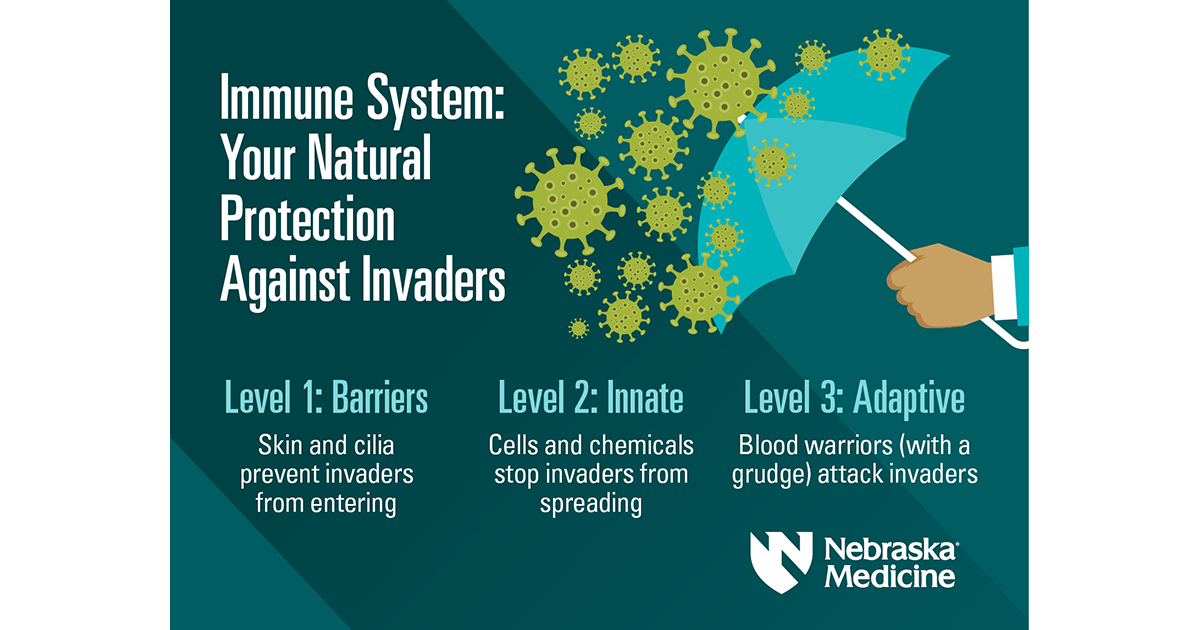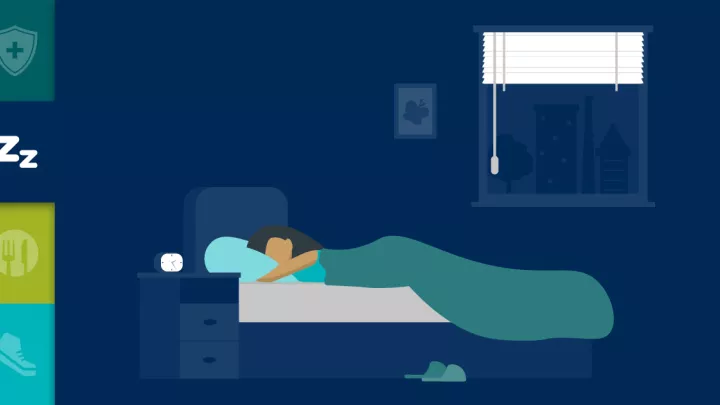3 simple ways to support your immune system

You may have heard about ways to support* your immune system. Perhaps you’ve heard that eating this or using that will magically prevent you from catching bugs like RSV, influenza or COVID-19.
Getting vaccinated is the best way to prevent influenza and COVID-19. But your everyday actions also influence your immune system to an extent. Find out how your immune system protects you against invaders.
Natural protection from invaders like the coronavirus
Your immune system protects you from possibly harmful invaders like bacteria, viruses, fungi and toxins.
“Your immune system fights invaders with three levels of response,” says infectious diseases expert Sara Bares, MD. “The first level includes your natural barriers like your skin. If an invader gets through, the second level is an innate response. Finally, the third level activates your antibodies through the adaptive immune response.”
Level 1: Barriers
Skin and cilia prevent invaders from entering
First the invader will meet your body’s natural barriers. Barriers like skin and cilia are Level 1 of your immune system.
Every day, your skin protects you from viruses and bacteria. There are tiny living things all over your body that never get through your skin. Proper hand washing kills many different types of invaders on your hands.
Fight disease: If your skin is cracked or bleeding, invaders can sneak through. Take care of your invader-stopping skin with rehydrating creams or ointments.
Your lungs also stop invaders. In your lungs, tiny hairs called cilia act like bouncers at a club. If an unwelcome intruder slips in the door, your tiny cilia hairs brush them away and escort them to another area. Cilia remove harmful intruders so your body can take them out.
Fight disease: Smoking (and vaping) damages cilia. When you stop smoking any drug, the cilia start to recover and get active again. Now is the perfect time to stop smoking to protect your lungs from viruses like RSV, influenza and COVID-19.
Level 2: Innate
Cells and chemicals stop invaders from spreading
Even with healthy skin, cilia and other barriers, an invader can slip through. It happens. That’s when Level 2 of your immune system kicks in.
When an invader gets in, your body’s cells and chemicals get on the scene fast – a lot like first responders in real life. In the immune system, these first responders prevent the spread of invaders in the body.
Called an innate response, the cells and chemicals fight all kinds of invaders. They love to fight and aren’t choosy. First responders include:
- Defensins send signals for help or fight invaders directly
- Cytokines send signals for help
- Natural killer cells destroy invaders
- Scavenger cells (like neutrophils and macrophages) destroy invaders
- Many other chemicals and cells
You can help your first responders by taking care of yourself.
Fight disease: Get good sleep, nutrition and activity to support your immune system’s response.
Level 3: Adaptive
Blood warriors (with a grudge) attack invaders
Your adaptive response happens in Level 3. Antibodies, blood warriors with a grudge, are part of that response.
A quick recap: Some antibodies harbor a long-lasting grudge and are called “memory” antibodies. These antibodies with a grudge help your body respond to the same invader much faster if you encounter it again.
Vaccines are made to produce these grudge-holding antibodies for you – without the need to experience a full-on illness.
Vaccines have been key in reducing or eliminating highly infectious diseases like polio, measles, rubella and smallpox. Researchers have developed four safe, effective COVID-19 vaccines.
Fight disease: Get vaccinated.
Want to strengthen your immune system? Tackle these three things
Your immune system fights infections using organs, cells and proteins that work together in a highly coordinated dance. Healthy eating, sleeping and activity habits make your immune system stronger.
“Doctors call sleep, nutrition and physical activity the Three Pillars of Health. You can support your immune system by improving any of these areas in your life,” says Dr. Bares.
*We use the word “support” here instead of boost. Boosting your immune system is actually something to avoid: just ask anyone with allergies or an autoimmune disease. In these cases your immune system is a little too reactive. But supporting your immune system? That’s something we can get behind.






